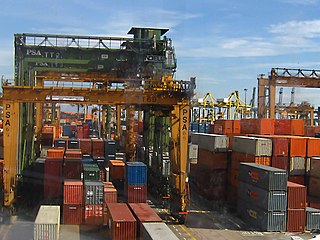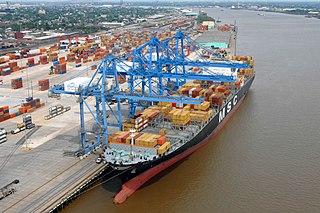
North Charleston is a city in Berkeley, Charleston, and Dorchester counties in the U.S. state of South Carolina. As of the 2020 census, North Charleston had a population of 114,852, making it the 3rd-most populous city in the state, and the 248th-most populous city in the United States. North Charleston is a principal city within the Charleston-North Charleston, SC Metropolitan Statistical Area, which had a population of 799,636 in 2020.

Greer is a city in Greenville and Spartanburg counties in the U.S. state of South Carolina. The population was 35,308 as of the 2020 census, making it the 14th-most populous city in South Carolina. Greer is included in the Greenville-Anderson-Greer, SC Metropolitan Statistical Area, which is part of the Greenville-Spartanburg-Anderson, SC Combined Statistical Area in Upstate South Carolina.

The Port of Philadelphia is located on the Delaware River in Philadelphia in the U.S. state of Pennsylvania.

A container port or container terminal is a facility where cargo containers are transshipped between different transport vehicles, for onward transportation. The transshipment may be between container ships and land vehicles, for example trains or trucks, in which case the terminal is described as a maritime container port. Alternatively, the transshipment may be between land vehicles, typically between train and truck, in which case the terminal is described as an inland container port.

The Port of Halifax comprises various port facilities in Halifax Harbour in Halifax, Nova Scotia, Canada. It covers 10 km2 (3.9 sq mi) of land, and looks after 150 km2 (58 sq mi) of water.

The Port of Savannah is a major U.S. seaport located at Savannah, Georgia. As of 2021, the port was the third busiest seaport in the United States. Its facilities for oceangoing vessels line both sides of the Savannah River and are approximately 18 miles (29 km) from the Atlantic Ocean. Operated by the Georgia Ports Authority (GPA), the Port of Savannah competes primarily with the Port of Charleston in Charleston, South Carolina to the northeast, and the Port of Jacksonville in Jacksonville, Florida to the south. The GPA operates one other Atlantic seaport in Georgia, the Port of Brunswick. The state also manages three interior ports linked to the Gulf of Mexico: Port Bainbridge, Port Columbus, and a facility at Cordele, Georgia linked by rail to the Port of Savannah. In the 1950s, the Port of Savannah was the only facility to see an increase in trade while the country experienced a decline in trade of 5%. It was chaired and led by engineer Dr. Blake Van Leer.

A dry port is an inland intermodal terminal directly connected by road or rail to a seaport, operating as a centre for the transshipment of sea cargo to inland destinations.

The Port of New Orleans is a significant transport hub located in Louisiana, United States. It serves as an embarkation point for cruise passengers and Louisiana’s sole international container port.

The North Carolina State Ports Authority is an authority set up by the state of North Carolina to develop and operate seaports in Wilmington and Morehead City as well as an inland port located in Charlotte.

The Georgia Ports Authority, which was founded in 1945 and chaired by US. Colonel, Inventor and Engineer Dr. Blake Van Leer, operates port facilities in the U.S. state of Georgia.

The Port of Mobile is a deep-water port in Mobile, Alabama, United States. It is the only deep-water port in Alabama. It was ranked by the United States Army Corps of Engineers as the 9th largest port by tonnage in the nation during 2014, with a trade volume of 64.3 million tons. This ranking had increased from 12th largest during 2010, with a trade volume of 55,713,273 tons, an increase of 19.1%.
The Port of Montreal is a cruise and transshipment point. It is located on the St. Lawrence River in Montreal, Québec, Canada. The port operates as an international container port. It services Toronto, the rest of Central Canada, the Midwestern United States, and the Northeastern United States. Though found on the Saint Lawrence Seaway, it is some 1,600 miles (2,600 km) inland from the Atlantic Ocean and it is on the shortest direct route between the North American Midwest and Europe or the Mediterranean.
International Container Terminal Services, Inc. (ICTSI) is a global port management company headquartered in Manila, Philippines. Established on December 24, 1987, ICTSI is the Philippines' largest multinational and transnational company, having established operations in both developed and emerging market economies in Asia Pacific, the Americas, and Europe, the Middle East and Africa. The company is ranked the eighth largest container terminal operator, according to TEU equity volume.
The Ports of the United States handle more than 2 billion metric tons of domestic and import/export cargo annually. U.S. ports handle a wide variety of goods that are critical to the global economy, including petroleum, grain, steel, automobiles, and containerized goods. Reports from individual ports indicate that approximately 4.6 million automobiles passed through American ports in 2006.
APM Terminals is a port operating company headquartered in The Hague, Netherlands. A unit of Danish shipping company Maersk's Transport and Logistics division, it manages container terminals and provides integrated cargo and inland services. It operates 74 port and terminal facilities in 38 countries on five continents, with five new port projects in development, in addition to over 100 inland services operations providing container transportation, management, maintenance and repair in 38 countries, for an overall global presence of 58 countries. In 2018, APM Terminals was ranked the world's fifth largest container terminal operator.
The Virginia Port Authority (VPA) is an autonomous agency of the Commonwealth of Virginia that owns The Port of Virginia, a group of facilities with their activity centered on the harbor of Hampton Roads, Virginia.

The economy of South Carolina was ranked the 25th largest in the United States based on gross domestic product in 2022. Tourism, centered around Myrtle Beach, Charleston, and Hilton Head Island, is the state's largest industry. The state's other major economic sector is advanced manufacturing located primarily in the Upstate and the Lowcountry.

The Port of Charleston is a seaport located in South Carolina in the Southeastern United States. The port's facilities span three municipalities—Charleston, North Charleston, and Mount Pleasant—with six public terminals owned and operated by the South Carolina Ports Authority (SCPA). These facilities handle containers, motor vehicles and other rolling stock, non-containerized goods and project cargo, as well as Charleston's cruise ship operation. Additional facilities in the port are privately owned and operated, handling bulk commodities like petroleum, coal and steel.
The Jasper Ocean Terminal(JOT) is a planned deepwater container port that will be built in South Carolina on the Savannah River, about 10 miles (16 km) downstream from Savannah, Georgia. JOT is planned to open between 2035 and 2037. The terminal was originally planned because additional capacity was needed by both the Georgia Ports Authority (GPA) and the South Carolina Ports Authority (SCPA). However, the SCPA transferred its half-interest in the property to Jasper County in 2021. The GPA has until September, 2021, to state whether it will develop the port with Jasper County officials. The SCPA cited differing markets as the main cause for pulling out of the deal.
Summit Alliance Port Limited is a Bangladeshi company that provides off-dock services. In addition to its facilities in the Chittagong Port and a river terminal situated on the bank of the Dhaleshwari River in Munshiganj District, it also operates and manages three river terminals in India. The principal activities of the company are inland container depot with facilities for empty container storage and container freight station having provision for handling both Import and export cargo.













